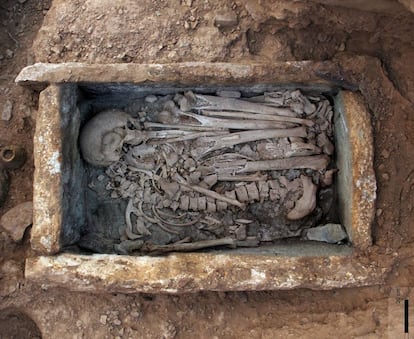The invasion that wiped out every man from Spain 4,500 years ago
New research indicates all local males on the Iberian peninsula were killed by hostile invaders with superior technology

More than 5,000 years ago a nomadic group of shepherds rode out of the steppes of eastern Europe to conquer the rest of the continent. The group, today known as the Yamna or Pit Grave culture, brought with them an innovative new technology, wheeled carts, which enabled them to quickly occupy new lands. More than 4,500 years ago, the descendants of these people reached the Iberian peninsula and wiped out the local men, according to new research by a team of international scientists.
“The collision of these two populations was not friendly; instead, the men who arrived almost completely pushed out the local men,” explains David Reich, a genetics professor at Harvard University who presented the results of the research at an event organized by New Scientist magazine on September 22, ahead of the study’s publication.
40% of the genetic information and 100% of the Y chromosomes come from the migrants
Spanish scientist Íñigo Olalde
The arrival of the hostile invaders in what is today Spain and Portugal had “a rapid and generalized genetic impact,” said Spanish scientist Íñigo Olalde at a conference two weeks ago in Jena, Germany. According to Olalde, during the Bronze Age, the subsequent populations had “40% of their genetic information and 100% of their Y chromosomes from the migrants.”
Given that children inherit the Y chromosome from their fathers, “this means that the men who arrived had preferential access to local women, again and again,” said Reich at the September event.
The study, which analyzed the DNA of the remains of 153 individuals dug up in the Iberian peninsula, is set to be published in one of the most important scientific journals in the world. Neither Reich or Olade, who are both from Harvard University, wanted to offer any more details. The geneticist Carles Lalueza-Fox, from the Barcelona Institute of Evolutionary Biology, also worked on the research.
Three years ago, another research team led by Reich suggested that Indo-European languages – the linguistic family to which most European languages belong – developed via the Yamna culture and their descendants.
The prehistorian Roberto Risch, from the Autonomous University of Barcelona, told EL PAÍS at the time that findings from the La Bastida dig, in the Spanish southeastern region of Murcia, had uncovered “a great surprise.”
The archaeology reveals a hierarchical society that broke with the old egalitarianism of the early Neolithic period Historian Roberto Risch
“We realized that the Iberian peninsula was not only colonized by the first Neolithic migration wave 8,000 or 9,000 years ago but also by a later one 4,500 years ago, which brought with it a very different culture,” he said.
War axes and carts with four wheels can be found in the layers of earth that date back 4,500 years. “From then on, almost all men’s tombs were filled with weaponry, adornments, displays of wealth. The archaeology reveals marked signs of a hierarchical society that broke with the old egalitarianism of the early Neolithic period,” said Risch.
The findings from Reich’s research team are also backed up by a study published last year by geneticists Dan Bradley from Trinity College in Dublin and Rui Martiniano from Cambridge University. This research team announced they had discovered a “discontinuity” in the Y chromosome during the Bronze Age in the Iberian Peninsula, after studying the DNA of the remains of 14 people found in archaeological sites in Portugal.
“In terms of why the Y chromosome was replaced, we could speculate that the populations from the steppes had superior technology, better weapons and also domesticated horses that could have given them an advantage in war,” says Martiniano.
English version by Melissa Kitson.
Tu suscripción se está usando en otro dispositivo
¿Quieres añadir otro usuario a tu suscripción?
Si continúas leyendo en este dispositivo, no se podrá leer en el otro.
FlechaTu suscripción se está usando en otro dispositivo y solo puedes acceder a EL PAÍS desde un dispositivo a la vez.
Si quieres compartir tu cuenta, cambia tu suscripción a la modalidad Premium, así podrás añadir otro usuario. Cada uno accederá con su propia cuenta de email, lo que os permitirá personalizar vuestra experiencia en EL PAÍS.
¿Tienes una suscripción de empresa? Accede aquí para contratar más cuentas.
En el caso de no saber quién está usando tu cuenta, te recomendamos cambiar tu contraseña aquí.
Si decides continuar compartiendo tu cuenta, este mensaje se mostrará en tu dispositivo y en el de la otra persona que está usando tu cuenta de forma indefinida, afectando a tu experiencia de lectura. Puedes consultar aquí los términos y condiciones de la suscripción digital.









































